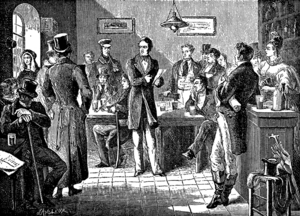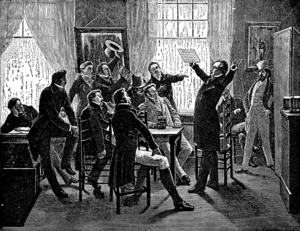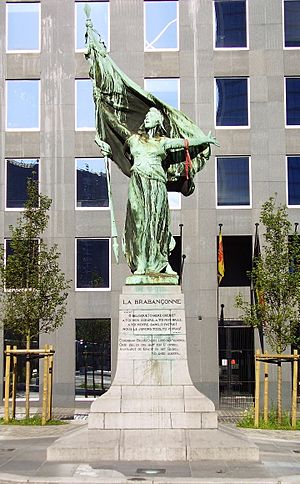La Brabançonne facts for kids
La Brabançonne is the national anthem of Belgium. It is a very important song for the Belgian people. This anthem celebrates Belgium's independence and its history.
Contents
La Brabançonne: Belgium's National Anthem
A national anthem is a special song that represents a country. It often tells about the nation's history, struggles, and hopes. People usually sing or play the anthem during important events. These can include sports competitions, national holidays, or official ceremonies. Anthems help unite people and show their pride in their country.
The Story Begins: 1830
The story of La Brabançonne starts in 1830. This was a very exciting time in Belgium. Before 1830, Belgium was part of the United Kingdom of the Netherlands. Many Belgians were unhappy with this situation. They wanted their own independent country. This led to the Belgian Revolution.
The revolution began in Brussels, the capital city. People took to the streets to demand their freedom. It was a time of great change and strong emotions. The revolution eventually led to Belgium becoming an independent nation.
Who Wrote the Words?
The original words for La Brabançonne were written by a Frenchman named Alexandre Dechet. He was also known by his pen name, Jenneval. Jenneval was an actor who lived in Brussels. He was very passionate about the Belgian cause.
He wrote the first version of the song in September 1830. This was right at the start of the revolution. The words were meant to inspire the Belgian rebels. They encouraged people to fight for their freedom. Sadly, Jenneval died in battle shortly after writing the song. He became a hero of the revolution.
Who Composed the Music?
The music for La Brabançonne was composed by François van Campenhout. He was a famous Belgian opera singer and composer. Van Campenhout heard Jenneval's words and was inspired. He quickly set them to music.
He performed the song for the first time in a Brussels theater. This happened in September 1830, during the revolution. The song quickly became very popular. It was sung by the revolutionaries as they fought for independence. The powerful music and inspiring words helped rally the people.
Becoming the Official Anthem
After Belgium gained its independence in 1830, La Brabançonne became its unofficial anthem. However, the original lyrics were very strong. They were written during a time of war and anger. They spoke harshly about the former rulers.
In 1860, the Belgian government decided to change the lyrics. The new words were written by Charles Rogier. He was a Belgian politician and former Prime Minister. The new lyrics were less aggressive. They focused more on Belgian unity and loyalty to the country and its king. This version is the one used today. It promotes peace and national pride.
Different Languages, One Anthem
Belgium has three official languages: French, Dutch, and German. Because of this, La Brabançonne has versions in all three languages.
- The French version is the most common.
- The Dutch version is also widely used.
- There is also a German version.
Even though the words are different, the meaning is the same. The anthem celebrates Belgium's freedom and its people. It reminds everyone of the country's journey to independence.
The Meaning of the Anthem
La Brabançonne is more than just a song. It is a symbol of Belgian identity. It represents the country's history, its struggles, and its triumphs. When Belgians hear their anthem, they remember the brave people who fought for their freedom.
The anthem encourages citizens to be loyal to their country. It speaks of unity and working together for a better future. It is a source of pride for Belgians everywhere.
Images for kids
See also
 In Spanish: La Brabanzona para niños
In Spanish: La Brabanzona para niños
 | James Van Der Zee |
 | Alma Thomas |
 | Ellis Wilson |
 | Margaret Taylor-Burroughs |





